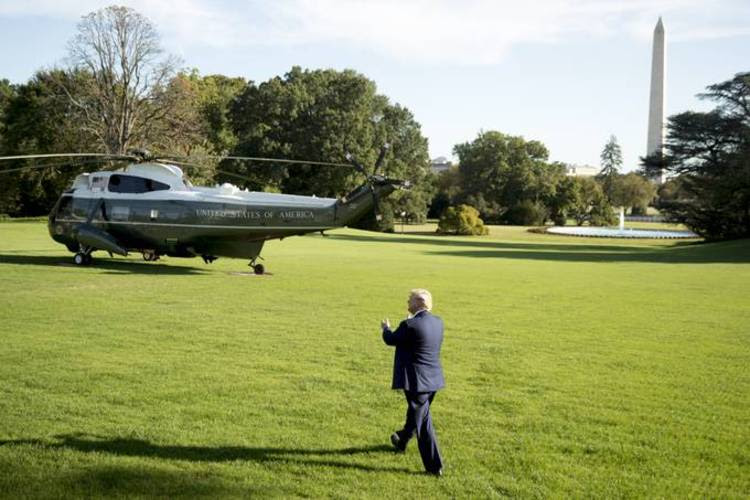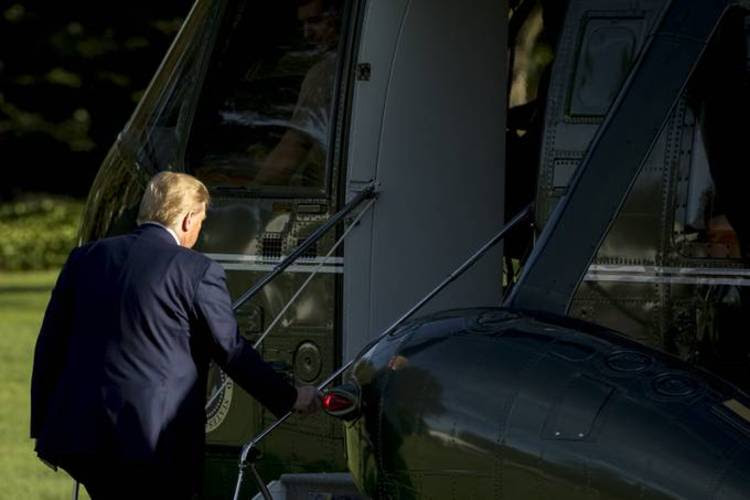
President Trump walks across the South Lawn of the White House on Thursday afternoon to board Marine One. (Andrew Harnik/AP)
THE BIG IDEA: The calls were coming from inside the White House.
John Eisenberg has been the top legal adviser to the National Security Council since the start of the Trump administration. That made him a figure of interest in the FBI’s investigation of former national security adviser Michael Flynn, the special counsel’s probe of Russian interference in the 2016 election and, now, the House’s inquiry into whether President Trump committed impeachable offenses by seeking the help of foreign governments to dig up dirt on a leading Democratic challenger in the 2020 election.
At least four national security officials were so alarmed by the Trump administration’s attempts to pressure Ukraine for political purposes that they raised concerns with Eisenberg before and immediately after Trump’s July 25 call with that country’s president, Greg Miller and Greg Jaffe scooped last night: “One official who had listened on the call went ‘immediately’ to Eisenberg. By the end of the next day, at least two others who had either heard the call or seen the rough transcript had also done so. … Within minutes, senior officials including national security adviser John Bolton were being pinged by subordinates about problems with what the president had said to his Ukrainian counterpart, Volodymyr Zelensky. …
“It is unclear whether some or all of the officials who complained to Eisenberg are also the ones who later spoke to the whistleblower. … But new details about the sequence inside the White House suggest that concerns about the call and events leading up to it were profound even among Trump’s top advisers, including Bolton and then-acting deputy national security adviser Charles Kupperman. …
“It is not clear whether Eisenberg took any action either after the warnings he received earlier in July or after the Trump-Zelensky conversation. One official said Eisenberg vowed he would ‘follow up,’ a message interpreted to mean that he intended to investigate the matter and perhaps relay the dismay up the ranks to White House counsel Pat Cipollone. If that occurred, it would help explain how the White House was already aware of concerns about the July 25 call when contacted by the CIA general counsel. … White House officials did not respond to questions about Eisenberg or to a request for comment.”
Revelations like these make it less tenable for Trump to dismiss the investigation into his conduct as a witch hunt. They also make it harder for his loyalists to brush aside the allegations of wrongdoing by questioning the motives of the whistleblower who filed a complaint with the intelligence community’s inspector general. These are additional examples of Trump’s own people being uncomfortable with how he was using the power of his office.
The cascading investigation into what happened also puts previously obscure figures under the glare of the national spotlight. Someone like Eisenberg could soon become a household name. But he’s not alone. The former DOJ lawyer is one of several officials at the upper echelons of the government who know the answers to some of the questions that have arisen about the president in the past few weeks. Together, they can choose to offer up – or conceal – the pieces that could complete the puzzle. Eisenberg is one of several new names you might hear a lot more about in the weeks ahead, especially as Congress returns next week from its fall recess.

Trump boards Marine One on Thursday. (Andrew Harnik/AP)
-- Here are three other names you might not have heard before:
1. Michael Duffey, the former executive director of the Wisconsin Republican Party who is now at the Office of Management and Budget, is one of the political appointees in the White House who intervened to freeze aid to Ukraine despite some career staffers raising concerns that the move was improper. “Duffey was involved in approving orders to hold back nearly $400 million in congressionally approved military aid for Ukraine,” Josh Dawsey and Karoun Demirjian report. “Acknowledging some of the concerns, White House budget aides eventually disclosed to other government officials that the money was being frozen outside of the normal ‘apportionment’ process. But they didn’t give officials at the State Department or other agencies a reason the money was being withheld, or who had initially made the decision to freeze it, after substantive discussions about whether the move was legal.”
2. Michael McKinley, a career diplomat and senior adviser to Secretary of State Mike Pompeo, has resigned his position amid rising dissatisfaction and plummeting morale inside the State Department over what is seen as Pompeo’s failure to support people ensnared in the Ukraine controversy. Karen DeYoung scoops: “A senior officer who has held a range of diplomatic posts, including ambassador to Afghanistan, Colombia and Peru, McKinley was serving as ambassador to Brazil last year when Pompeo recruited him as a policy adviser and a conduit between his office and the career service. … Although he had no direct involvement with Ukraine, part of McKinley’s job involved taking the temperature of the building for Pompeo. Like many others, he was disappointed in the secretary’s lack of public support for diplomats who have been named in the Ukraine controversy…”
3. Michael Pillsbury, one of Trump’s China advisers, publicly contradicted himself on whether he received information on Hunter Biden during a visit to Beijing shortly after Trump called on China to investigate the son of the former vice president. “I got a quite a bit of background on Hunter Biden from the Chinese,” Pillsbury was quoted as telling the Financial Times. Hours later, appearing on C-SPAN, Pillsbury denied making the comment. “I haven’t spoken to the Financial Times for a month,” he said. Then the FT made public a Wednesday email from Pillsbury, which included that quote.
Reached by The Post, Pillsbury gave a different explanation. “Most everything I learned was already public or well-known,” he said. “Pillsbury said he spoke with Trump just before he went on his trip to China last month, but he said the president didn’t ask him to raise Biden to Chinese officials,” David Lynch and Dawsey report. “The China expert said he’d never spoken with Trump about Hunter Biden but was aware of the president calling for the Chinese to investigate from the South Lawn of the White House last week. ‘What a wonderful, hypothetical question,’ he said, when asked if he plans to report back to Trump. Pillsbury declined to say more, saying that White House officials had asked him not to disclose his conversations with the president.”
|
Pages
▼

No comments:
Post a Comment